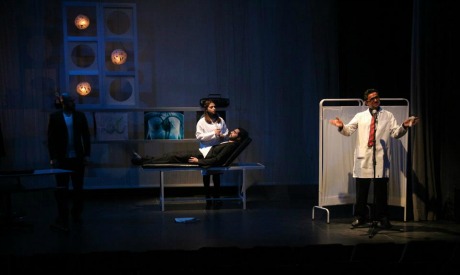
I am now dead (Photo: Ahmed Rouby, Courtesy of Hani Afifi)
Nine years after it featured at the French Institute’s Jeunes Créateurs (Young Creators) theatre festival, the black comedy I am Now Dead is back on stage at Falaki Theatre between 14 and 16 May.
There are several factors that prompted director and writer Hani Afifi to bring the production back to the stage – the grimness that fills the air in Egypt now, the current state of politics and society, which resemble the years leading up to the 2011 revolution, plus youth who are too uninspired to truly participate in the political process and the media playing its own game through propaganda and the economic crisis.
While Afifi's team thought they would make significant changes in the script, they ended up altering only a few lines in the original text to bring the performance up to date.
"Now things are much worse than they were in 2005, [when the play premiered]," Afifi told Ahram Online over a cup of tea in Groppi café on Talaat Harb Street, where the world rushed past the windows. "We find ourselves having the same problems, the same issues, the same state."
Based on several sessions of brainstorming and improvisation, along with collective work from the entire cast, I am Now Dead does not have a traditional dramaturgical structure but instead consists of a series of scenes that have been uniquely compiled and presented. The play is a personal take by Afifi and co-writer Bassem Sharaf on the state of Egyptian youth today, who find themselves caught in a myriad of social, political and ideological struggles.
"It is about the distortion we live as contemporary Egyptian and Arab youth," explained Afifi, who says he identifies with the youth, naturally. "We are not positive or negative. We are affected by our surroundings but we don’t do anything about it. We are neither religious nor without morals. We take an extremely central stance on everything. We are not cultured but we’re not ignorant. We graduated from universities but we are not educated."
With the scenography becoming a painting, and projections taking over the back panels, the play sits well visually.
Afifi appears in the first scene of the play, saying: "There was once a young man going through traffic, trying to catch the sun before it went down." This signifies the hope the young man is trying to capture, but – just as Cairo's traffic always makes us miss appointments, in turn becoming a recurrent excuse – the young man seems to fail to catch the sun each time.
There is also a scene about media distortion via the radio and TV. The main character, played by actor Yehia Youssry, is lying on a stretcher in the hospital when the doctor (Emad Ismail) says that his "case is not stable and is getting worse. Maybe when he is out of the coma, I can tell you if the case is very dangerous or if he will wake up or not."
According to Afifi, Youssry's character is stuck between life and death, which is why the play is called I am Now Dead – it's impossible to talk to someone when they are dead, a theatrical implication on the state of today's generation: they don’t feel alive, even though, somehow, they are.
The doctor continuously appears in Youssry's head and with him, many interventions enter the character's subconscious: a Salafist sheikh speaking to him harshly, the manipulative media, lying politicians, past presidents Gamal Abdel-Nasser and Anwar Sadat – which, here, represent Egypt's contemporary history – and many other images which only serve to underscore the continuity of the state of distortion in which he finds himself stuck.
While touching on important elements of contemporary society and mirroring them in the audience, I am Now Dead also carries amusing elements.
Watching the performance nine years after it premiered and realising that not much has changed, neither on the performance's textual level nor in the country, might prove to be a heavy burden. In a subtle manner, the thought pushes itself to the forefront.
The play won several awards in 2005 and 2006 when it toured Cairo, Alexandria and Minya. It also did well at the Jeunes Créateurs Festival in 2005, picking up awards for Best Performance, Best Director and Best Actor, before going on to claim the Jury Award at the National Egyptian Theatre Festival in 2006.
Programme:
Wednesday 14, Thursday 15 and Friday 16 May at 8pm
Falaki Theatre, AUC Downtown Campus, Downtown, Cairo
Short link: